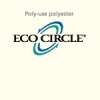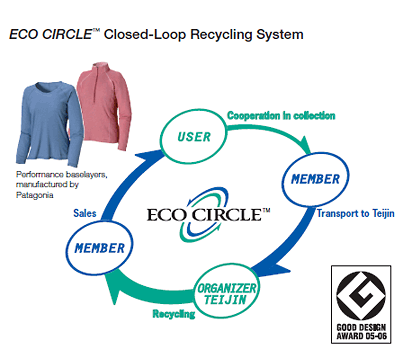
Next generation sustainable carpet backings
Teijin Fibers Limited has announced today that the Eco Circle Garment Accessories Association, an organization dedicated to promoting the enhanced recyclability of garments through the use of more eco-friendly accessories, welcomed Hong Kong Non-Woven Fabric Industrial Co., Ltd. (HKNW) as its first overseas member on July 1. HKNW now develops recyclable products such as fibrefill insulations for the apparel, outdoor and furnishings markets, using Teijin Fibers’ Ecop

14th July 2009
Innovation in Textiles
|
Osaka
 Teijin Fibers Limited has announced today that the Eco Circle Garment Accessories Association, an organization dedicated to promoting the enhanced recyclability of garments through the use of more eco-friendly accessories, welcomed Hong Kong Non-Woven Fabric Industrial Co., Ltd. (HKNW) as its first overseas member on July 1. HKNW now develops recyclable products such as fibrefill insulations for the apparel, outdoor and furnishings markets, using Teijin Fibers’ Ecopet polyester fibre made from recycled PET bottles.
Teijin Fibers Limited has announced today that the Eco Circle Garment Accessories Association, an organization dedicated to promoting the enhanced recyclability of garments through the use of more eco-friendly accessories, welcomed Hong Kong Non-Woven Fabric Industrial Co., Ltd. (HKNW) as its first overseas member on July 1. HKNW now develops recyclable products such as fibrefill insulations for the apparel, outdoor and furnishings markets, using Teijin Fibers’ Ecopet polyester fibre made from recycled PET bottles.
Eco Circle is an environmentally friendly closed-loop recycling system for polyester products that employs chemical recycling technology. Teijin Fibers established the Eco Circle Garment Accessories Association in October 2008 for the related promotion of environmentally conscious garment accessories made and marketed by Japanese manufacturers, wholesalers and trading companies. Accessories developed by the association members are made of Teijin’s Ecopet or Eco Circle Fibers, the latter being a chemically recycled fibre produced from used polyester products.
Thanks to the participation of HKNW, which sells to both Asian and Western markets, the increased international availability of recyclable accessories will help Eco Circle members and other garment manufacturers around the world to develop products offering greater recyclability, Teijin says.
One of the challenges of encouraging the wider adoption of the Eco Circle system has been the industry’s practice of using non-recyclable accessories, such as linings, buttons and interlinings. Non-recyclable accessories cannot be put through the Eco Circle system, requiring time to remove the accessories before the remaining materials can be processed.
Recyclable accessories are thus a key to the continued expansion of Eco Circle, and they also help to reduce the permanent disposal of garments containing materials that otherwise could be recycled. Moreover, Teijin says, the use of accessories developed by the association members eliminates the time required to test garments for their recyclability, meaning these garments can be quickly registered as Eco Circle products.
What’s more, the use of recyclable accessories can raise the polyester ratio of products, sometimes to as high as 100%, so in many cases total garments can be recycled.
The Eco Circle system chemically decomposes polyester at the molecular level and converts it into new polyester raw materials. Companies that participate in Eco Circle activities collaborate with Teijin to develop and manufacture products made from recyclable materials, as well as collect these products at the end of their useful lives for a new round of recycling. Since its launch in 2002, Eco Circle has attracted the participation of more than 110 companies, mostly apparel and sportswear manufacturers. Overseas members continue to increase and now include major brands such as Patagonia, Swany America and Quiksilver in France.
Looking ahead, Teijin Fibers hopes to expand foreign participation in the Eco Circle Garment Accessories Association, thereby strengthening its contribution to the environment through the wider global adoption of its Eco Circle system.

Business intelligence for the fibre, textiles and apparel industries: technologies, innovations, markets, investments, trade policy, sourcing, strategy...
Find out more